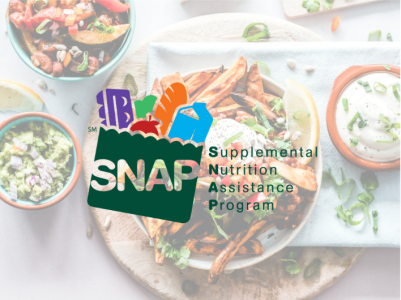Act fast to save your SNAP Benefits—here's what you need to do
By
Aubrey Razon
- Replies 0
Attention, GrayVine members! If you rely on SNAP benefits, a critical deadline is approaching. Could missing this deadline put your assistance at risk?
SNAP, formerly known as Food Stamps, is a lifeline for over 40 million Americans, providing them with the means to purchase nutritious food.
While the program operates under federal guidelines, each state has its own set of rules and schedules for distributing benefits, which can be a source of confusion for recipients.
Recertification is a periodic review process required to ensure that SNAP beneficiaries still meet the eligibility criteria to continue receiving assistance.

This process involves submitting updated information about income, household composition, and other factors that could affect eligibility.
The length of time between recertifications can vary from one month to three years, depending on individual circumstances.
The consequences of not completing your SNAP recertification on time can be severe.
Without this crucial step, benefits may cease, leaving households without the means to afford basic food items. It's a preventable situation that no one should have to face.
In Texas, for example, recipients are given a specific “active or certification period” during which they must complete their recertification.
This period is communicated through an official approval letter from the state office.
As the end of this period approaches, beneficiaries receive an expiration notice, which includes the deadline for the recertification process.
In the Lone Star State, SNAP participants can stay ahead of the game by using their Your Texas Benefits online account to set up Message Center alerts and sign up for renewal notifications.
The exact date to begin the recertification process can be found online by checking the status of your case.
If you see a “Ready for Renewal” message or a task listed under “My Cases,” it's time to act.
To renew on time, the completed application form must be submitted by the fifteenth day of the last month of your certification period.
It's also essential to adhere to the rules regarding scheduled and canceled interview appointments, as these are part of the recertification process.
For those wondering about benefit distribution, Texas residents typically receive their SNAP benefits during the first week of the month.
The specific date depends on the last digit of your Eligibility Determination Group (EDG) number.
EDG numbers ending in 00-03 and 54-57 will see benefits available on January 16th, while those ending in 96-99 can expect them on January 28th.
The full schedule is available here and should be checked regularly to ensure you know when to anticipate your benefits.
Don't let a missed deadline disrupt your access to SNAP benefits. Here's what you can do to stay on track:
1. Check your certification period and note the recertification deadline.
2. Set up alerts in your Your Texas Benefits account or mark the date on your calendar.
3. Gather the necessary documents and information ahead of time to avoid last-minute scrambling.
4. Complete and submit your recertification application before the due date.
5. Attend any required interviews or appointments as part of the recertification process.
 Have you gone through the SNAP recertification process recently? Do you have tips for others on how to manage these deadlines effectively? Share your experiences and advice in the comments below.
Have you gone through the SNAP recertification process recently? Do you have tips for others on how to manage these deadlines effectively? Share your experiences and advice in the comments below.
SNAP, formerly known as Food Stamps, is a lifeline for over 40 million Americans, providing them with the means to purchase nutritious food.
While the program operates under federal guidelines, each state has its own set of rules and schedules for distributing benefits, which can be a source of confusion for recipients.
Recertification is a periodic review process required to ensure that SNAP beneficiaries still meet the eligibility criteria to continue receiving assistance.

Recipients must keep track of their certification period and complete the recertification process on time. Image source: Ella Olsson and USDA/Pexels.
This process involves submitting updated information about income, household composition, and other factors that could affect eligibility.
The length of time between recertifications can vary from one month to three years, depending on individual circumstances.
The consequences of not completing your SNAP recertification on time can be severe.
Without this crucial step, benefits may cease, leaving households without the means to afford basic food items. It's a preventable situation that no one should have to face.
In Texas, for example, recipients are given a specific “active or certification period” during which they must complete their recertification.
This period is communicated through an official approval letter from the state office.
As the end of this period approaches, beneficiaries receive an expiration notice, which includes the deadline for the recertification process.
In the Lone Star State, SNAP participants can stay ahead of the game by using their Your Texas Benefits online account to set up Message Center alerts and sign up for renewal notifications.
The exact date to begin the recertification process can be found online by checking the status of your case.
If you see a “Ready for Renewal” message or a task listed under “My Cases,” it's time to act.
To renew on time, the completed application form must be submitted by the fifteenth day of the last month of your certification period.
It's also essential to adhere to the rules regarding scheduled and canceled interview appointments, as these are part of the recertification process.
For those wondering about benefit distribution, Texas residents typically receive their SNAP benefits during the first week of the month.
The specific date depends on the last digit of your Eligibility Determination Group (EDG) number.
| Eligibility Determination Group (EDG) number ending in 3 | Benefits are available on January 6th |
| Eligibility Determination Group (EDG) number ending in 4 | Benefits available on January 7th |
| Eligibility Determination Group (EDG) number, ending in 5 | Benefits are available on January 9th |
| Eligibility Determination Group (EDG) number, ending in 6 | Benefits are available on January 11th |
| Eligibility Determination Group (EDG) number ending in 7 | Benefits available on January 12th |
| Eligibility Determination Group (EDG) number ending in 8 | Benefits available on January 13th |
| Eligibility Determination Group (EDG) number ending in 9 | Benefits available on January 15th. |
Post-June 2020 certifications
If your certification was completed after June 1st, 2020, the distribution schedule is slightly different.EDG numbers ending in 00-03 and 54-57 will see benefits available on January 16th, while those ending in 96-99 can expect them on January 28th.
The full schedule is available here and should be checked regularly to ensure you know when to anticipate your benefits.
| EDG number ending in 00-03 | Benefits available on January 16th |
| EDG number ending in 54-57 | Benefits available on January 16th |
| EDG number ending in 04-06 | SNAP payments available on January 17th |
| EDG number ending in 58-60 | SNAP payments available on January 17th |
| EDG number ending in 07-10 | SNAP payments available on January 18th |
| EDG number ending in 61-64 | SNAP payments available on January 18th |
| EDG number ending in 11-13 | SNAP payments available on January 19th |
| EDG number ending in 65-67 | SNAP payments available on January 19th |
| EDG number ending in 14-17 | SNAP payments available on January 20th |
| EDG number ending in 68-71 | SNAP payments available on January 20th |
| EDG number ending in 72-74 | SNAP payments available on January 21st |
| EDG number ending in 21-24 | SNAP payments available on January 22nd |
| EDG number ending in 75-78 | SNAP payments available on January 22nd |
| EDG number ending in 25-27 | SNAP payments available on January 23rd |
| EDG number ending in 79-81 | SNAP payments available on January 23rd |
| EDG number ending in 28-31 | SNAP payments available on January 24th |
| EDG number ending in 82-85 | SNAP payments available on January 24th |
| EDG number ending in 32-34 | SNAP payments available on January 25th |
| EDG number ending in 86-88 | SNAP payments available on January 25th |
| EDG number ending in 35-38 | SNAP payments available on January 26th |
| EDG number ending in 89-92 | SNAP payments available on January 26th |
| EDG number ending in 39-41 | SNAP payments available on January 27th |
| EDG number ending in 46-49 | SNAP payments available on January 27th |
| EDG number ending in 93-95 | SNAP payments available on January 27th |
| EDG number ending in 42-45 | SNAP payments available on January 28th |
| EDG number ending in 50-53 | SNAP payments available on January 28th |
| EDG number ending in 96-99 | SNAP payments available on January 28th |
Don't let a missed deadline disrupt your access to SNAP benefits. Here's what you can do to stay on track:
1. Check your certification period and note the recertification deadline.
2. Set up alerts in your Your Texas Benefits account or mark the date on your calendar.
3. Gather the necessary documents and information ahead of time to avoid last-minute scrambling.
4. Complete and submit your recertification application before the due date.
5. Attend any required interviews or appointments as part of the recertification process.
Key Takeaways
- Thousands of American households risk losing their SNAP benefits if they don't complete recertification promptly.
- Each state has its own rules and schedules for SNAP, adding complexity to maintaining benefits.
- In Texas, SNAP benefits are distributed during specific days in the month, based on the recipient’s EDG number.
- Recipients must keep track of their certification period and complete the recertification process on time to avoid losing benefits.






